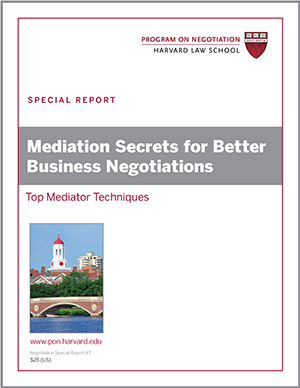
Worldwide, mediation has become a common means of resolving conflict, ranging from divorce to workplace disputes to broken contracts. Yet mediation remains an underused tool for resolving disputes in U.S. professional sports leagues, writes Adelphi University professor Mark Grabowski in his article “Both Sides Win: Why Using Mediation Would Improve Pro Sports” in the Journal of Sports & Entertainment Law.
This is true despite the fact that when parties in sports-related disputes do try mediation, they often see dramatic results. As Grabowski explains, mediation has helped pro sports in the past and could greatly improve efficiency if applied more widely.
How meditations helped the NHL
Consider the National Hockey League’s (NHL) 2012 dispute with the NHL Players’ Association (NHLPA) over the terms of their next collective-bargaining agreement. With the two parties at an impasse and about $200 million apart on the issue of player revenue-sharing, the league locked out the players. Weeks turned into months of canceled games, and the specter of another canceled season loomed. (The NHL had canceled its entire 2004-2005 season due to a similar dispute.)
A breakthrough came when federal mediator Scot L. Beckenbaugh entered the picture, according to USA Today. When face-to-face negotiations got heated, Beckenbaugh separated the two sides and engaged in shuttle diplomacy for about 12 hours, visiting each side in turn to identify issues where they might be flexible. Sixteen additional hours of negotiation led to a win-win deal that hinged on the issue of player pensions. The agreement allowed NHL players, whose careers are often short, to concede on the short-term issue of salary in return for peace of mind regarding their long-term financial future.
Mediator Beckenbaugh widely received “hero’s praise” from NHL players, management, fans, and the sports media for finding a way to bring the parties together in a way that met each side’s interests, according to the website SB Nation.
How the NFL benefited from mediation
The NHL isn’t the only pro sports league that has benefited from mediation in the recent past. In 2011, court-sponsored mediation helped the National Football League take key steps toward resolving its labor dispute and player lockout through negotiation.
Mediator Arthur Boylan began by bringing NFL commissioner Roger Goodell and the head of the NFL Players Association, DeMaurice Smith, together for lunch and asking them to talk “about their families and background—everything but football,” according to Grabowski. By helping the parties find common ground, Boylan enabled them to build the trust they needed to ultimately resolve their dispute through negotiation.
Capitalizing on how the mediation process works
Grabowski argues that the types of conflict that often crop up in professional sports, including labor, disciplinary, and broadcast disputes, are ripe for resolution with mediation.
That’s in part because of what happens in mediation: an impartial third party—a trained mediator—works to try to help disputants find common ground and end their impasse. In the type of voluntary mediation that’s common in the business world, the two sides choose their mediator jointly, they have ultimate responsibility for reaching a mutually beneficial agreement, and they may walk away from the process at any time.
For these reasons and others, mediation has a proven track record for success, leading to the resolution of an estimated 70-80% of disputes, ranging from divorces to corporate contract disputes, according to the American Bar Association.
How mediations can benefit pro sports
Grabowski outlines a number of reasons that sports disputes are particularly likely to benefit from using mediation more often to resolve disputes, including the following:
• Privacy and confidentiality.
Vocal third parties, ranging from sports agents to fans, often get in the way of an agreement in sports disputes. Because mediation is a confidential, fast, and cost-effective process, it can allow parties to devise face-saving compromises out of the public eye.
• A win-win agreement.
Unlike arbitration, the dispute resolution process often favored in professional sports, mediation generally leads to a win-win rather than win-lose agreement. In addition, disputants have greater control over how mediation unfolds, as compared to arbitration or litigation.
• More productive relationships.
The arbitration process favored in Major League Baseball often leads to take-it-or-leave-it offers that result in an impasse or damaged relationships that hinder player performance on the field, writes Grabowski. By contrast, the confidential and collaborative nature of mediation is far more likely to preserve and even improve relationships between players and team management in baseball and other sports.
When mediation is tried at all to resolve a pro sports dispute, it is usually a last-ditch “Hail Mary pass,” writes Grabowski. Ideally, he argues, mediation should take place early on in a dispute, before parties have become deeply entrenched in their positions and fans have stoked grievances on both sides. By explicitly calling for mediation in their collective-bargaining agreements, Grabowski argues, sports leagues could save themselves many millions of dollars—and, by building win-win relationships, allow their teams to pursue win-lose victories uninterrupted.
How do you think mediation helps sports negotiations?




